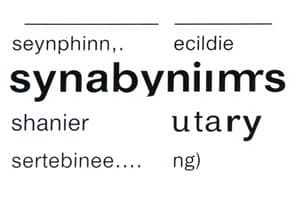Podcast
Questions and Answers
Which of the following words is a synonym for 'happy'?
Which of the following words is a synonym for 'happy'?
- Heavy
- Depressed
- Joyful (correct)
- Mournful
What is an antonym for the word 'hot'?
What is an antonym for the word 'hot'?
- Bright
- Warm
- Bright
- Cool (correct)
How do synonyms enhance writing?
How do synonyms enhance writing?
- By providing variety (correct)
- By simplifying grammar
- By making texts longer
- By reducing vocabulary
Which strategy best aids in mastering synonyms and antonyms?
Which strategy best aids in mastering synonyms and antonyms?
Why is understanding antonyms important for vocabulary development?
Why is understanding antonyms important for vocabulary development?
Flashcards are hidden until you start studying
Study Notes
Synonyms
- Definition: Words that have the same or similar meanings.
- Examples:
- Happy: Joyful, Cheerful, Elated
- Sad: Unhappy, Mournful, Sorrowful
- Fast: Quick, Rapid, Speedy
- Usage:
- Enhances writing by providing variety.
- Helps to avoid repetition in speech and writing.
Antonyms
- Definition: Words that have opposite meanings.
- Examples:
- Happy: Sad, Unhappy, Depressed
- Hot: Cold, Cool, Chilly
- Light: Dark, Heavy, Dull
- Usage:
- Clarifies meaning by contrasting ideas.
- Contributes to a deeper understanding of vocabulary.
Importance of Synonyms and Antonyms
- Vocabulary Development: Expands language skills and expressive ability.
- Contextual Understanding: Aids in grasping nuanced meanings in different contexts.
- Improved Communication: Encourages precise expression and comprehension in conversation and writing.
Strategies for Learning
- Thesaurus Use: Consult a thesaurus to find synonyms and antonyms.
- Flashcards: Create flashcards with words on one side and synonyms/antonyms on the other.
- Contextual Practice: Write sentences using synonyms and antonyms to reinforce learning.
- Games: Engage in word games that focus on identifying synonyms and antonyms.
Tips for Mastery
- Regular Reading: Exposure to varied texts can introduce new vocabulary.
- Active Usage: Incorporate new words into daily conversation to solidify understanding.
- Group Study: Discuss and quiz each other on synonyms and antonyms to enhance retention.
Synonyms
- Words sharing the same or similar meanings.
- Examples include:
- Happy: Joyful, Cheerful, Elated
- Sad: Unhappy, Mournful, Sorrowful
- Fast: Quick, Rapid, Speedy
- Usage improves writing variety and prevents repetition.
Antonyms
- Words with opposite meanings.
- Examples include:
- Happy: Sad, Unhappy, Depressed
- Hot: Cold, Cool, Chilly
- Light: Dark, Heavy, Dull
- Enhances understanding by contrasting ideas and meanings.
Importance of Synonyms and Antonyms
- Contributes to vocabulary development and expressive capability.
- Aids in contextual understanding, helping to grasp nuanced meanings.
- Improves communication by promoting precise expression in both conversation and writing.
Strategies for Learning
- Utilize a thesaurus for discovering synonyms and antonyms.
- Create flashcards to reinforce learning, writing words on one side and their counterparts on the other.
- Practice contextual writing by forming sentences that incorporate synonyms and antonyms.
- Participate in word games aimed at identifying and using these words.
Tips for Mastery
- Engage in regular reading to encounter diverse vocabulary in context.
- Actively use new words in conversations to solidify knowledge and understanding.
- Form study groups for discussing and quizzing on synonyms and antonyms, enhancing memory retention.
Studying That Suits You
Use AI to generate personalized quizzes and flashcards to suit your learning preferences.




